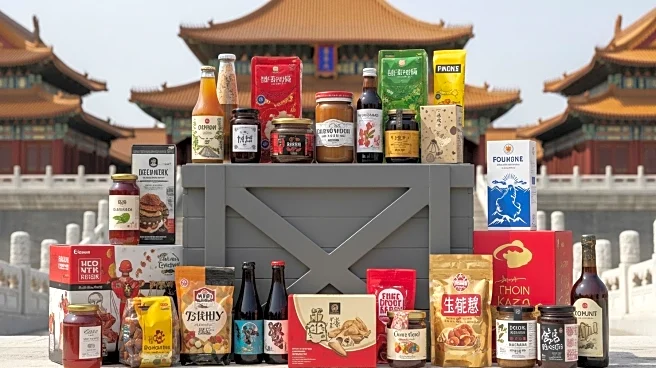What's Happening?
President Trump's imposition of sweeping tariffs on global imports is prompting food and drink exporters to seek alternative markets, notably China. The tariffs, intended to boost U.S. jobs and economy, have led to increased interest in China from exporters worldwide. Brazil, a major coffee producer, faces a 50% U.S. import tax, making China an attractive market due to its growing cafe culture. Brazilian exporters are now looking to China to sell millions of coffee bags previously destined for the U.S. Similarly, Indian exporters of tea and seafood are turning to China following a 50% U.S. tariff and additional levies related to India's oil purchases from Russia. These tariffs have caused U.S. buyers to pause orders, affecting exporters' strategies.
Why It's Important?
The shift in export markets due to U.S. tariffs could have significant economic implications. For U.S. consumers, the tariffs may lead to higher prices for imported goods, such as coffee, as costs are passed down the supply chain. Exporters in countries like Brazil and India are diversifying their markets, potentially reducing their reliance on the U.S. This could weaken the U.S.'s position as a primary trade partner and strengthen economic ties between these countries and China. The tariffs also risk straining diplomatic relations, as affected countries may view them as punitive measures, prompting them to seek alliances elsewhere.
What's Next?
Exporters are likely to continue diversifying their markets, with China emerging as a key alternative. This shift may lead to long-term changes in global trade patterns, with China gaining influence as a major trading partner. U.S. businesses and consumers may face increased costs, prompting potential backlash against the tariffs. Ongoing trade negotiations and potential adjustments to tariff policies will be crucial in determining future trade dynamics. Exporters will also explore opportunities in Europe, where free trade agreements could offer new avenues for growth.
Beyond the Headlines
The tariffs highlight broader geopolitical shifts, with countries reassessing their trade alliances in response to U.S. policies. This realignment could lead to a more multipolar trade environment, reducing U.S. dominance. The situation underscores the interconnectedness of global trade and the potential for policy decisions to have far-reaching consequences. Ethical considerations also arise, as tariffs impact small businesses and consumers, raising questions about the fairness and effectiveness of such measures.











